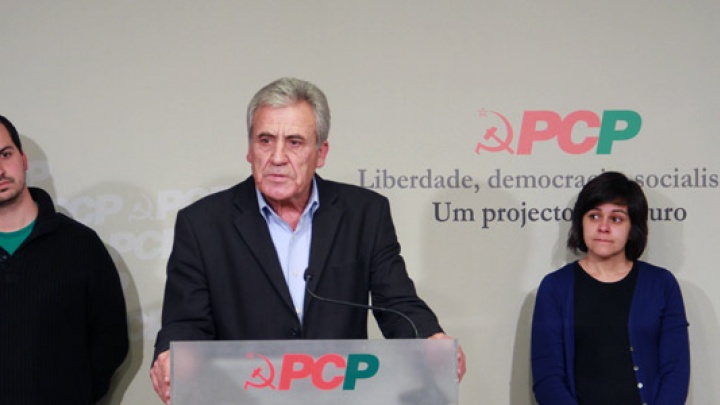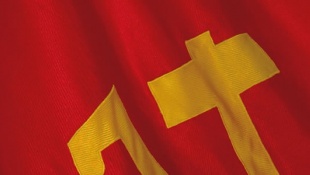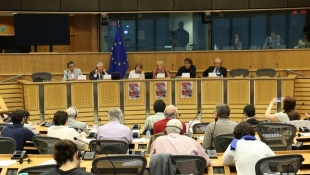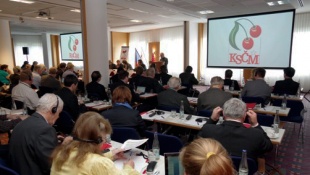Statement by Jerónimo de Sousa, General Secretary of the PCP
27th February 2012
In its two day meeting the Central Committee analysed the economic and social situation and the consequences resulting from the Pact of Aggression. It evaluated the development of the mass struggle and defined the main tasks of the Party, as well as decided on aspects of organisation, contents and dynamization of the preparatory debate of the XIX Congress of the PCP, to be held this year.
The Central Committee cannot fail to stress as a significant aspect of the evolution of the national political situation, the magnitude and historical significance of last 11 February demonstration, at the Terreiro do Paço Square, in Lisbon. A demonstration that is an unequivocal expression of the increasing dissatisfaction with the present course of the country and a clear sign of the significant erosion of the social base of support of the government. A demonstration that represents a new phase in the struggle against the right-wing policy in Portugal.
Inseparable from the deepening of the right-wing policy and the ongoing impositions of the pact of aggression negotiated between PS, PSD and CDS and the IMF, ECB and EU, the country is witnessing a fast deterioration of the living conditions of almost the whole population, an increase in the exploitation of the workers, of injustice and sharp economic decline.
As the PCP has repeatedly warned, the course imposed by this pact not only fails to solve any of the country’s problems but, every passing day makes them worse.
This is very clear in the worsening of the recession in which the economy was plunged, with successive downward revisions of the expected evolution of the GDP (between the signature of the pact of aggression in May last year and today, the expected fall of the GDP in 2012, has almost doubled from - 1,8% to -3.3%).
The economic and social policies imposed by the pact are launching our country into an ever deeper recession which could drag on for several years, with severe consequences on the levels of unemployment, precariousness, deepening of the imbalance in distribution of income, increasing poverty rates and worsening of regional asymmetries.
It is particularly significant that, at the precise moment when the government presented a package of amendments to the labour legislation, INE, the National Statistics Bureau, revealed a new and alarming increase in the unemployment rate which, in a broad sense, reaches 20.3%, which represents more than a million and 160 thousand unemployed
A situation that reveals a course of economic downfall which if not stopped will worsen in the future.
The worsening of exploitation, based on attacks against labour income and workers’ rights – backbone and main goal of the ongoing policy -, is accompanied by a vast offensive that affects different aspects of the life of the population, which slashes rights, degrades living conditions and ruins production and the micro, small and medium sized businessmen.
An offensive that seriously affects: the right to healthcare of the Portuguese people, with unsustainable increases in health payments and savage cuts in NHS funding; the right to housing, with the approval of a law that will dump thousands of families on the streets; local government and public services; the right to mobility with an attack on public transport, namely by means of unaffordable increases in the price of transport; public schooling and the right to education, reflected in cuts in funding, changes in curricula, elimination of social aids to students.
The proposed amendments to the labour legislation, presented by the government in the Assembly of the Republic, represent, in the framework of this vast offensive, a true declaration of war against the workers and against their rights (easier dismissals and cuts in compensation; attack on collective bargaining; cuts in the payment of overtime and work on rest days, the imposition of a bank of work hours; the elimination of four holidays and reduced vacation days). This is a project to radically change labour relations and that now the government aims to extend to workers in Public Administration with the revision of Government Service Work.
The Central Committee of the PCP stresses, in this context and framework of combating this policy of national disaster, the decisive role of the workers’ and peoples’ struggle.
To this effect, assumes particular importance the calling, by CGTP-IN, of a General Strike this coming 22 March. The Central Committee urges all Party members to commit themselves in its organisation and mobilisation to ensure its success.
At a time when the ruinous consequences for the country and its development brought by the application of the Pact of Aggression emerge clearly, the struggle for its rejection constitutes a national imperative, a patriotic objective indispensable to defend the dignity and living conditions of the Portuguese and national sovereignty.
Hence, it renews its appeal to the workers and the people to converge in an increasingly stronger current of protest and struggle for its rejection.
In a context of great political and social complexity, marked by a huge political and ideological offensive by big capital, the Central Committee stresses that the CGTP-IN Congress represented, through the force and determination shown by hundreds of delegates and guests, through the decisions taken and votes obtained, a huge success, with a very significant impact at the national and international level.
As part of the ongoing offensive and policies of aggression, the PCP denounces the process of alienation of strategic companies and sectors which, with the privatisation of REN- National Electric Network and EDP- Electricity Company of Portugal meant a new and serious boost which, in fact, jeopardizes public control of the indispensible tools for the economic and sovereign development of the country!
It also draws attention to the recent and disturbing steps taken in the process of capitalist integration of the European Union with the approval of the European Financial Stabilisation Mechanism and of the budgetary and fiscal pact, that the PSD/CDS government tamely endorsed and which constitutes a serious step in the imposition and institutionalisation of the policies contained in the European Union and IMF programmes.
The Central Committee, confirming the guidelines defined for this phase of national life and considering the great demands placed by the situation concerning the Party´s leadership work during this year, points to the necessity of materialising an integrated action where a broad unity and development of struggle, are articulated with the intensification of the Party’s political intervention, the various planned initiatives for the current year, the action «Forward! For a stronger PCP» and the preparation of the XIX Congress.
In the context of PCP’s intense activity in the current year, it stresses the importance of the preparation of the XIX Congress, to be held on 30 November, 1 and 2 December 2012 and the need for the participation, involvement and contribution by the party collective for its success.
The Central Committee adopted a Resolution on the XIX Congress and made decisions concerning its preparation and implementation, particularly regarding its methodology, phasing and objectives, and decided that it will be held at the Municipal Sports Complex – City of Almada.
It pointed a series of central issues for the initial debate on the content of the Theses – Draft Political Resolution and set the guidelines regarding the draft amendments to the Party Programme, which constitute the basis for reflection and discussion by the organisations and militants, and pointed aspects to begin drawing the documents to be presented, and defined three interconnected and complementing phases for the preparation and holding of the XIX Congress.
The Central Committee calls on the Party’s organisations and militants, on the whole party collective, with their experience, reflection and opinion, to contribute for the success of the XIX Congress, on the path of the struggle for a rupture with the right-wing policy, for a patriotic and left policy, for an advanced democracy and socialism.



